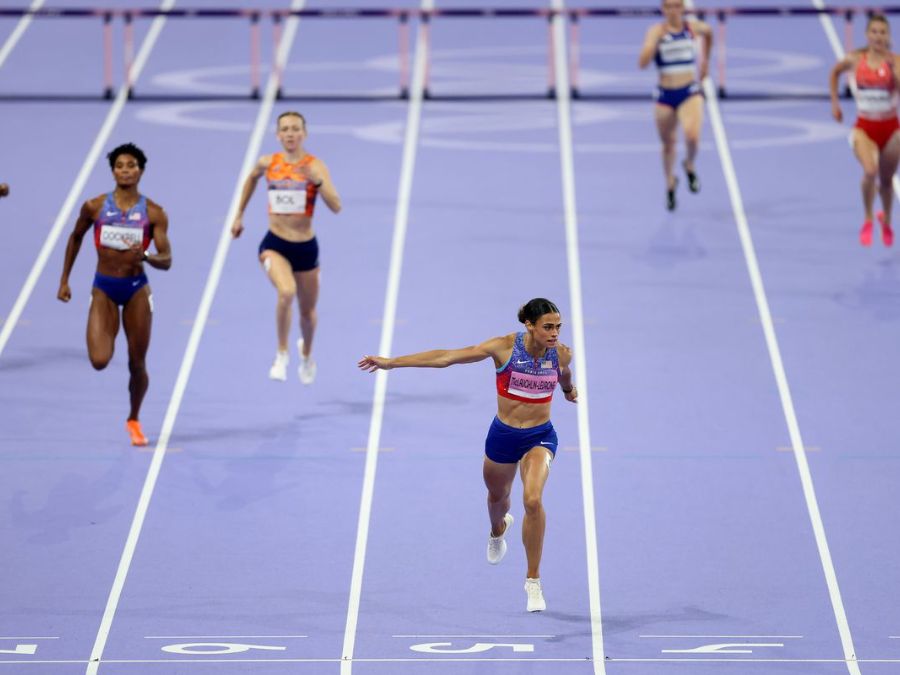Sydney McLaughlin-Levrone has done it again. For a third time she completed a US Trials-global championships world record double in the 400 metres hurdles in the Stade de France on Thursday night (8 August).
McLaughlin-Levrone raced over the 10 hurdles to her second Olympic gold medal in 50.37 seconds, taking almost a full three-tenths of a second off the world record 50.65 she had run at the US Olympic Trials at the end of June.
She achieved the same feat in winning the world championship in Budapest last year. She also did it in taking her first Olympic victory in Tokyo in 2021. And it took a similar feat by Dalilah Muhammad to hold off an emerging Sydney McLaughlin at both the US championships and the Doha 2019 world championships.
At the moment, McLaughlin-Levrone is perfection. It’s starvation rations as far as competitive appearances go, but peak gluttony when it comes to rewriting the records. Since her Doha silver medal, McLaughlin-Levrone has improved from 52.23 second-best all-time to 50.37 via world record stops at 51.90, 51.46, 51.41, 50.68 and 50.65.
Coming into Paris it seemed the Dutch star Femke Bol was poised to offer the sternest challenge yet to McLaughlin-Levrone. Chasing the world record holder, Bol has lifted her own sights, as have McLaughlin-Levrone’s US opponents. Bol won last year’s world championships in the absence of the American and just before Paris became the second woman to go under 51 seconds with a 50.95 performance in Switzerland. Helpful altitude, sure, but you need every boost you can get when you’re chasing someone as good as McLaughlin-Levrone.
In the Olympic final, McLaughlin-Levrone was drawn a lane inside Bol. For five hurdles it looked like a race but once the American athlete drew level around the turn Bol seemed to crumble. If this was an all-out assault, it fell apart. As McLaughlin-Levrone raced on to a world record, Bol struggled unsuccessfully to hold off Anna Cockrell for second. The ‘other’ American ran 51.87, Bol 52.15.
Cockrell actually reduced the margin to her phenomenal teammate from the massive 1.99 seconds at the US Trials to a scarcely-less decisive 1.50 in Paris. Small victories.
But in the world of women’s 400 metres hurdles, it seems it is still Sydney, or the bush. Somewhere back of beyond at that.
If the earth wasn’t shattered by a McLaughlin-Levrone boilover it was rattled just minutes earlier by the defeat of Noah Lyles in the 200 metres.
Paris was supposed to be something of a redemption for Lyles after a third-place finish in Tokyo three years ago. Sure, he faced challengers in teammates Kenny Bednarek and Erriyon Knighton, and Botswana’s Letsile Tebogo, but nothing he couldn’t handle.
The first sign something might be amiss was a shot from a call-room camera showing Lyles wearing a mask. Turns out it was not a case of Lyles shielding himself from others, but of minimising the chances of Lyles impacting them. It was subsequently confirmed that Lyles had tested positive for Covid a few days earlier.
Lyles would have had to have been near his very best, though, to take down Tebogo. The 21-year-old showed remarkable poise and speed endurance as he drew away from Bednarek and Lyles over the last 50 metres. He crossed the line in 19.46 seconds, shaving 0.04 off his previous best, with Bednarek second in 19.62 and Lyles third in 19.70.
Tebogo is the first African runner to win the 200 and he took down the African record previously set by Frankie Fredericks in taking the silver medal behind Michael Johnson at the Atlanta 1996 Olympics.

A mighty battle on the field was fought out in the men’s javelin. Politics limits the amount of competition between neighbours Pakistan and India, but it is pretty intense when it happens. No different on the infield of the Olympic stadium than on the cricket fields, either. Defending champion Neeraj Chopra of India threw 8.45 metres, which would win almost any competition, anywhere, anytime.
Pakistan’s Arshad Nadeem had other ideas. After a first-round foul he produced an Olympic record 92.97 effort which was only threatened for the remainder of the competition by his own last-round 91.79.
Nardeem’s winner, and that last-round effort, both exceeded the Olympic record set by dual javelin gold medallist Andreas Thorkildsen at the Beijing 2008 Games.
Even with Noah Lyles missing out, the USA took three of the five gold medals decided on the night. Tara Davis-Woodhall won the women’s long jump with a best of 7.10 and Grant Holloway closed the night out with a 12.99 victory in the 110 hurdles a metre ahead of teammate Daniel Roberts and Rasheed Broadbell of Jamaica.
In this year of the repechage, it’s worth noting Freddie Crittenden’s sixth place in 13.32. The third American in the final trotted through his first-round heat saying he had been suffering from the after-effects of treatment on his legs. He then advanced to the semis through the repechage and made his way into the final. Nice work, but that didn’t feature among the repechage’s selling points.



